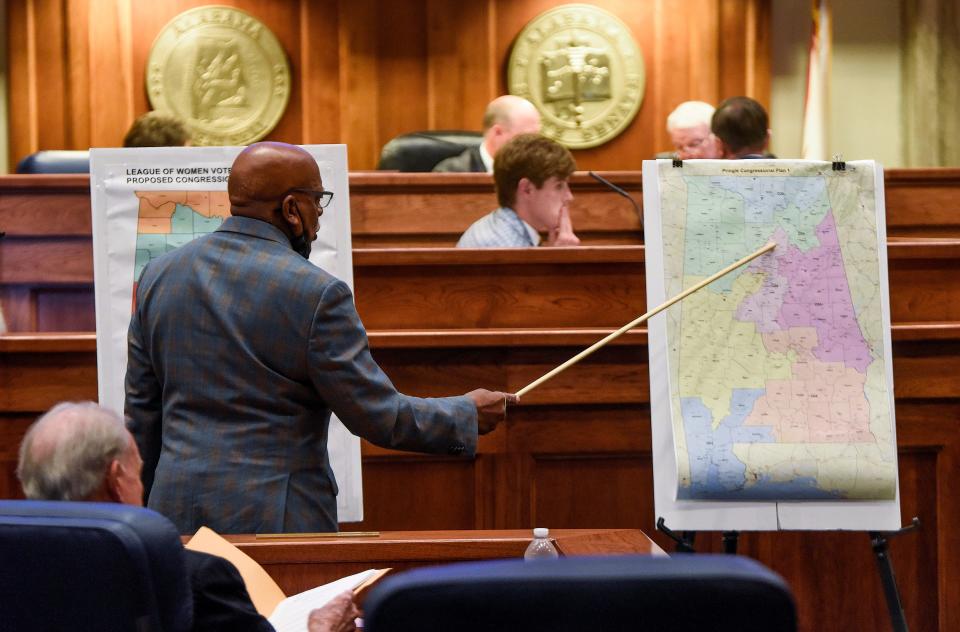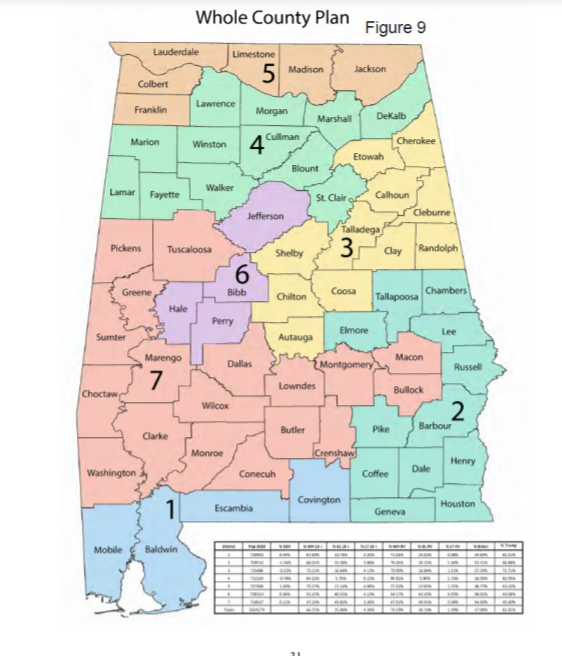Federal court blocks Alabama's new congressional district map, saying it's not fair to Black voters

A three-judge federal panel late Monday blocked Alabama's new congressional district map from going into effect, ruling that challengers were "substantially likely" to prevail in their arguments that the plan violated the Voting Rights Act (VRA).
In a 225-page decision, the judges found that Black Alabamians had "less opportunity than other Alabamians to elect the candidates of their choice to Congress." The congressional map as approved preserves a nearly 30-year plan of having a single majority-minority congressional district, the 7th in west Alabama.
From Jan. 4: Federal judges hear testimony in Alabama redistricting lawsuit

"Both sets of plaintiffs ... suggest, and we agree, that as a practical reality, the evidence of racially polarized voting adduced during the preliminary injunction proceedings suggests that any remedial plan will need to include two districts in which Black voters either comprise a voting-age majority or something quite close to it," the three-judge panel wrote in its opinion.
In a statement Monday evening, the Alabama Attorney General's Office said it "strongly disagreed" with the court's decision and would file an appeal in the coming days.
Evan Milligan, one of the plaintiffs in the case, said in a statement Monday that the map approved by the Legislature "fails Alabama's voters of color."
"We deserve to be heard in our electoral process, rather than have our votes diluted using a map that purposefully cracks and packs Black communities," the statement said. "Today, the court recognized this harm and has ordered our elected officials to do better."
The case consolidated three separate lawsuits. All three argued that the single district constituted a racial gerrymander that prevented Black voters living outside the 7th congressional district from forming alliances with like-minded white voters and electing candidates of their choice.
"Alabama’s steadfast refusal to provide Black voters with adequate representation in Congress is a product of intentional discrimination and directly linked to the state’s history and present conditions of discrimination against Black people," said the brief in Milligan v. Merrill, one of the three cases. "The state’s intentional policy of disempowerment and discrimination has resulted in the denial of equal opportunity for Black people to participate in the political process in violation of the U.S. Constitution and the VRA."
Attorneys for the state said the maps followed traditional redistricting lines, and that adjustments to boundaries were made without regard to race.
The panel — consisting of U.S. Circuit Judge Stanley Marcus, appointed by President Bill Clinton, and U.S. District Judges Anna Manasco and Terry Moorer, appointed by President Donald Trump — agreed with the plaintiffs, and said the state should consider drawing a second majority-Black district or one with a substantial Black population. They also argued the remedies proposed by the plaintiffs would split communities of interest and ignored traditional redistricting principles.
"The Legislature enjoys broad discretion and may consider a wide range of remedial plans," the ruling said. "As the Legislature considers such plans, it should be mindful of the practical reality, based on the ample evidence of intensely racially polarized voting adduced during the preliminary injunction proceedings, that any remedial plan will need to include two districts in which Black voters either comprise a voting-age majority or something quite close to it."
The judges also pushed the Jan. 28 deadline for congressional candidates to qualify to run in the May primaries to Feb. 11 to give the plaintiffs time to draw the map. The opinion left open the possibility of the court doing so if the state could not meet the deadline.
Lawsuits challenging the state's legislative map are pending.
Contact Montgomery Advertiser reporter Brian Lyman at 334-240-0185 or blyman@gannett.com. Updated at 9:19 p.m. with further information and comments from the Attorney General's Office and plaintiff Evan Milligan.
This article originally appeared on Montgomery Advertiser: Alabama congressional map blocked by federal court

 money
money 